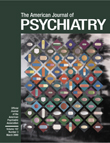Development of Major Depression After Treatment for Smoking Cessation
Abstract
OBJECTIVE: Case studies suggest cigarette abstinence may precipitate a major depressive episode. This study examined the incidence and predictors of major depression in the 12 months after treatment for smoking cessation. METHOD: Participants (N=304, 172 women) were recruited from two trials of smoking cessation. Both trials provided psychological group intervention, but one group received treatment with nicotine gum and the other was given nortriptyline or placebo. The incidence of major depressive episodes was identified by the Inventory to Diagnose Depression, which was administered at follow-up assessments. RESULTS: The 12-month incidence of major depression after treatment for smoking cessation was 14.1% (N=43). Multiple logistic regression analyses indicated that history of depression, baseline Beck Depression Inventory score, college education, and age at smoking initiation were significant predictors of major depression after treatment. Abstinence at the end of treatment did not significantly predict major depression. CONCLUSIONS: Patients who achieved abstinence from smoking showed a risk of developing depressive episodes similar to those who failed to achieve abstinence. As expected, patients who had a history of depression were more likely to experience depressive episodes after treatment for smoking cessation. The 12-month incidence of major depression in this study group was higher than that observed in the general population, but reasons for the elevation were not clear.



